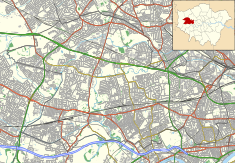Acton Town Hall
| Acton Town Hall | |
|---|---|
 Acton Town Hall | |
| Location | Acton, London, England |
| Coordinates | 51°30′23″N 0°16′04″W / 51.5063°N 0.2677°W |
| Built | 1910 |
| Architect | Raffles and Gridley |
| Architectural style(s) | Baroque style |
Listed Building – Grade II | |
| Designated | 20 November 2003 |
| Reference no. | 1390770 |
Acton Town Hall is a municipal building in High Street, Acton, London, England. It is a Grade II listed building.[1]
History
The facility was commissioned to replace an existing 19th century town hall in the High Street, which had been designed by Edward Monson in the Italianate style for the local board of health.[2] The site chosen for the new building was to the north of an early 19th century gothic style building known as Berrymead Priory.[3]
The foundation stone for the new building on 3 April 1909.[2] It was designed by Raffles and Gridley in the Baroque style and was built by F.G. Minter of Putney on Acton Lane.[1] It was officially opened by Herbert Nield, the Member of Parliament for Ealing on 10 March 1910.[4] The design involved seven bays with a central arched doorway flanked by Doric order columns on the ground floor; there were sash windows on the first floor and smaller windows on the second floor.[1]
The building was established as the offices of the Acton Urban District Council and went on to become headquarters of the Municipal Borough of Acton when it was granted county borough status in 1921.[5] A separate structure, now known as the "King's Rooms Building", was designed by William Leicester and built further to the east along the High Street: it opened in 1926.[6] The King's Rooms Building was intended to provide access and facilities for the swimming baths.[6]
The main building was extended to the east along the High Street (towards the King's Rooms Building) to the designs of William Leicester in the late 1930s.[1] The enlarged building, which included a large assembly hall with stage and balcony on the High Street frontage, was officially re-opened by Lord Rochdale, the Lord Lieutenant of Middlesex, on 24 June 1939.[4] The design for the extension involved a three-bay central section with the main entrance on the ground floor, a balcony and picture window on the first floor, the coat of arms of the borough on the second floor and a clock tower above.[1] A Victory Ball to mark the end of the Second World War was held in the concert hall in 1945.[4]
The assembly hall continued to serve as an events and concert venue and performers included the band, The Who, in September 1962.[7] The town hall ceased to function as the local of seat of government when the enlarged London Borough of Ealing was formed in 1965.[8] The building subsequently accommodated, amongst other things, a local council information bureau and the local registrar's office.[9]
The assembly hall was the scene of a live recording by Joe Strummer & The Mescaleros, subsequently released as Live at Acton Town Hall, in November 2002.[10] The concert, a fundraiser for the FBU, was one of Joe Strummer's final gigs before his death later that year, as well as the last time he performed with former bandmate Mick Jones, who joined him for the encore.[11]
After becoming surplus to requirements, the complex was converted for residential use in 2018.[12] As part of the conversion, the council chamber was transformed into a large open living space.[13]
References
- ^ a b c d e Historic England. "Acton Town Hall (1390770)". National Heritage List for England. Retrieved 1 May 2020.
- ^ a b "London's Town Halls". Historic England. p. 47. Retrieved 25 April 2020.
- ^ "Berrymead Priory". Acton History. Retrieved 25 April 2020.
- ^ a b c "Acton Town Hall". London Borough of Ealing. Retrieved 1 May 2020.
- ^ "Welcome to a Short History of Acton, Middlesex". Acton History. Retrieved 25 April 2020.
- ^ a b "Acton Town Hall: Supplementary Planning Document" (PDF). London Borough of Ealing. 1 December 2013. p. 86. Retrieved 25 April 2020.
- ^ Neill, Andrew; Kent, Matthew (2009). Anyway, Anyhow, Anywhere: The Complete Chronicle of the WHO 1958–1978. Sterling Publishing Company. p. 304. ISBN 978-1402766916.
- ^ "Local Government Act 1963". Legislation.gov.uk. Retrieved 25 April 2020.
- ^ Bolton, Diane K; Croot, Patricia E C; Hicks, M A (1982). "'Acton: Local government', in A History of the County of Middlesex: Volume 7, Acton, Chiswick, Ealing and Brentford, West Twyford, Willesden". London: British History Online. pp. 30–32. Retrieved 26 August 2020.
- ^ "RSDBF '12 Special Release: Joe Strummer - Live At Action Town Hall". Recordstoreday.com. Retrieved 25 April 2020.
- ^ "Flashback: The Clash's Mick Jones and Joe Strummer Reunite in 2002". Rolling Stone. Retrieved 19 May 2021.
- ^ "Acton's Iconic Old Town Hall Development Comes to Market". Refurb Projects. 1 June 2018. Retrieved 25 April 2020.
- ^ "Former Acton town hall transformed into new homes". Ealing Times. 26 September 2019. Retrieved 25 April 2020.

